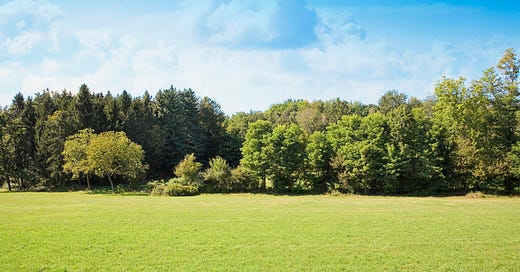I don’t often write about a specific industry in this newsletter, but many readers know I work with family businesses in agriculture. On June 5, the theologian Walter Brueggemann died, and it reminded me of his book The Land, which I quoted in the column below almost 10 years ago. I thought those of you in farming and ranching businesses, or those of you who serve land owners, might enjoy reading this reflection on why land is a special part of your legacy.
Among all of the financial assets you pass on to the next generation, perhaps none is as valuable and unique as your agricultural land. Indeed, land holds a special place in our psyche: We’ve heard “they don’t make any more of it,” or we’re reminded of Warren Buffett’s statement that he’d prefer all the farmland in the United States to all of the gold in the world. Here are some deeper reasons why I believe land is such a special part of your legacy.
LAND SERVES PEOPLE IN MULTIPLE WAYS. Land provides food and nutrition for others in the world. Through certain crops, it also provides energy for our country, clothing and from trees, shelter. It provides an economic livelihood for millions, space for people to experience nature and, for those who own the land, financial security in retirement.
When you consider the productivity of your assets, what other resource does so much for so many throughout life? This special resource is part of your legacy, and if you take care of the land, the land, in so many ways, will take care of you.
LAND CONNECTS US TO OTHERS. Ownership of land creates a bond among family members, a connection between generations past and future. Joint ownership of land provides a reason to come together as a family and talk, plan, explore … and sometimes even fight.
Land also connects us to our neighbors. At some point in your history, you have probably received help from, or provided assistance to, a neighbor due in large part to your shared border. Your land creates a bond with the people around you, and that bond often translates into care for one another. And when you consider the jobs provided to those who farm your land or the income you spend in the local town because of farming or rental income, this economic fruit of the land connects us to other people in our communities.
LAND GIVES US STORIES. For many of us, the emotional attachment to land is connected with memories. I recall long, slow drives with my grandfather to check the crops, listening to his stories about the dust bowl, blizzards, floods and other life-altering events for our family. I remember picking sweet corn, learning to ride a horse, building fences, irrigating and nurturing crops. The theologian Walter Brueggemann writes, “Land is never simply physical dirt but is always dirt freighted with social meanings derived from historical experience. There are no meanings apart from roots.”
The land is where you learned certain values. Discipline. Stewardship. The value of hard work. Appreciation for someone’s skills. Respect for nature. Gratitude for God’s bounty. In many ways, land is the foundation for principles we teach our children today.
LAND IS THE EVIDENCE OF FAITH. Through land, we see the cycle of life and death; Ecclesiastes 3:2 reminds us there is “a time to plant and a time to uproot.” Through land, we see God’s physical commitment to provide and to nourish. In the Bible, land is a central tenant of God’s commitment to his people. In this way, land is bound up in our most deeply held beliefs.
There are likely many assets that you will pass on to your children. Land, however, is unique for its capacity to serve humanity, to connect us to one another and to create meaning for your family. Land also has the potential to create conflict over differences in management or perspectives about its disposition. Take care in how you plan and communicate the transition of this special legacy.
Originally published in the October 2016 issue of Progressive Farmer.


